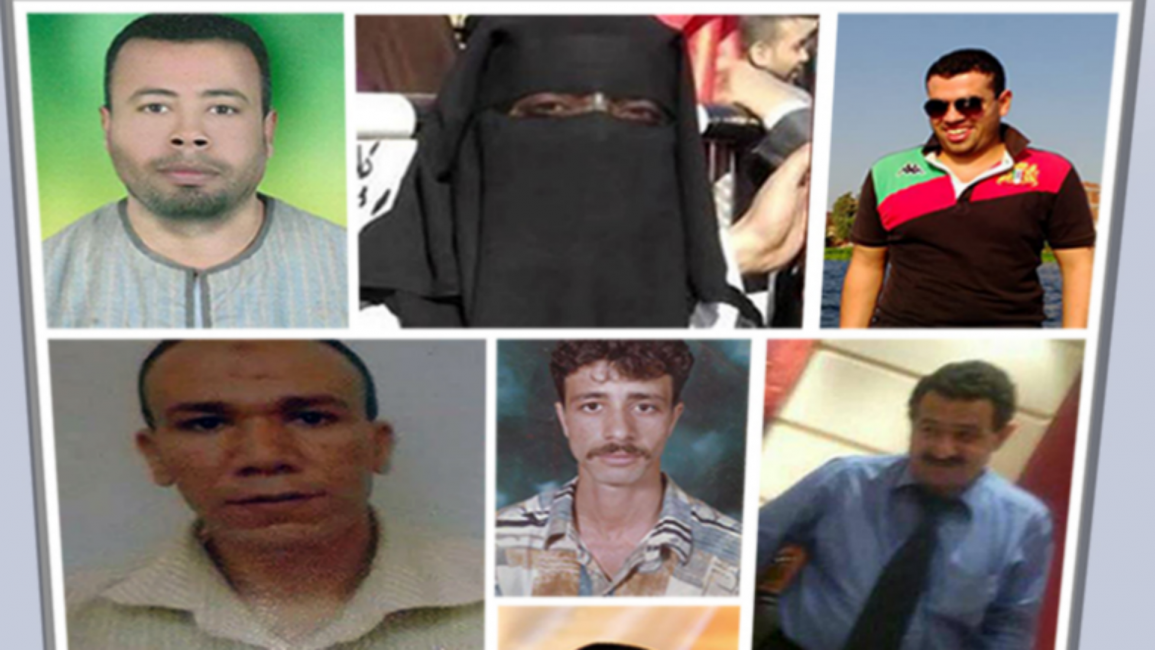Egyptian regime 'systematically' disappearing opponents
Egyptian regime 'systematically' disappearing opponents
An Arab human rights organisation says hundreds of Egyptians have disappeared as the brutal crackdown on opponents by Sisi's coup regime continues.
2 min read
The AOHR report documents 129 people gone missing during the 2013 crackdown [AOHR]
An NGO for human rights in the Arab World has released a report on a wave of Egyptian political dissidents and journalists going missing in highly suspect circumstances, following the 2013 military coup.
The Arab Organisation for Human Rights in the United Kingdom [AOHR] released a report entitled “The Missing in Egypt Await their Fate” last week which calls attention to a phenomenon rights groups have dubbed “enforced disappearances”.
“One of the most serious crimes the Egyptian government is continuing to commit against members of the opposition is enforced disappearances,” the report said.
“Following the 2013 military coup, Egyptian authorities began systematically committing this crime to terrorise opponents, prevent resistance against the military, suppress freedom of opinion and expression and kill the democratic process,” it added.
Amr Ibrahim is one the 129 people documented as going missing during 2013 in the AOHR report.
The 24-year-old has been missing since July 2013 when he was arrested with a friend by security forces during anti-government clashes just before the Rabaa and al-Nahda square massacres.
According to Ibrahim’s friend, they were taken to an undisclosed located where they were blindfolded and their hands bound until the friend was released.
The Arab Organisation for Human Rights in the United Kingdom [AOHR] released a report entitled “The Missing in Egypt Await their Fate” last week which calls attention to a phenomenon rights groups have dubbed “enforced disappearances”.
“One of the most serious crimes the Egyptian government is continuing to commit against members of the opposition is enforced disappearances,” the report said.
| Following the 2013 military coup, Egyptian authorities began systematically committing this crime to terrorise opponents - AOHR |
Amr Ibrahim is one the 129 people documented as going missing during 2013 in the AOHR report.
The 24-year-old has been missing since July 2013 when he was arrested with a friend by security forces during anti-government clashes just before the Rabaa and al-Nahda square massacres.
According to Ibrahim’s friend, they were taken to an undisclosed located where they were blindfolded and their hands bound until the friend was released.
Despite Ibrahim’s family making tireless efforts to find him, filing dozens of court cases to try and make authorities reveal what happened, he is still missing.
More recently in June, activist Suhaib Saad was arrested by plainclothes police as he left a restaurant in the quiet Cairo suburban neighbourhood of Maadi, thrown into the back of white minivan and blindfolded, according to Reuters.
Five weeks later Saad, was forced to appear on television, looking dishevelled and weak and confess to a role in what the military called a dangerous terrorist cell.
Saad’s photojournalist friend Esraa al-Taweel was also arrested outside the restaurant and is now facing changes of spreading false news.
Taweel recently smuggled a letter out prison describing her conditions, “Water here in prison is very unhygienic. It causes skin infections and smells like sewage,” she said.
Human Rights Watch issued a report in June, in which it highlighted the issue of the enforced disappearances in Egypt.
"Egyptian authorities should immediately disclose their whereabouts and hold those responsible to account," the report said.
"The authorities should either release anyone illegally detained or charge the person with a recognisable crime," it added.



